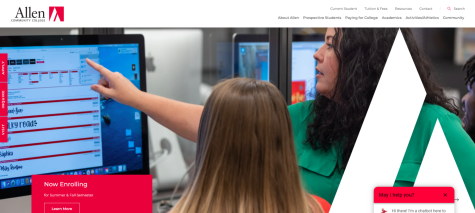Allen Initiates Changes to Payment Plans: International Students Affected
April 28, 2023
After a few students demonstrated their concerns about a new policy change concerning the international students’ payment plans that the college’s administrative board plans to implement beginning next academic year, fall 2023, the Allen Flame met with Cynthia Jacobson, Vice President of Student Affairs, to discuss and clarify what this change is really about.
Overall, there are a few options to pay for college, and Allen is an institution that attempts to help everyone that asks for options to pay for college. Nevertheless, during the 2020 pandemic, Allen began to implement a payment plan. In partnership with the Nelnet platform, students could apply for and access a payment plan that allowed them to pay for their classes over the course of the semester. It was an aid intended for all students but was used more by international students.
But, after two years the payment plan has not been totally useful for the college and its students. In fact, Cynthia Jacobson said that the board members concluded that “the payment plan method has prejudiced more than helped students. For instance, the Nelnet platform has limitations or just doesn’t work with some international accounts.
Therefore, international students are forced to open a bank account in the United States where their parents or sponsors can send them money. This arrangement led to problem number two. This involved students having problems receiving transactions, either via a bank or Western Union. This then lead to delays in payments or, in some cases, no payment at all.
After analyzing the current situation and past events and looking forward to the changes they want to implement with the new guideline, Cynthia discussed how the administration is looking to help all Allen students.
The first decision was to stop offering the payment plan with Nelnet because the platform is not 100% effective for the different nationalities on campus. They also want to stop students, parents, and sponsors from worrying about how and when to send money.
For this reason, Allen will begin requiring a deposit from all international students. $1500 of which $100 is the housing deposit and the remaining $1400 will not only pay for enrollment at Allen but will also pay for the college. In other words, the remaining amount could be said to function as the first down payment.
In fact, Cynthia mentioned one way in which international students could pay for college. It would start from the moment they get their student visa, and the I-20 is issued. The admissions office would offer the option to start paying for college before coming to Iola. The student could start paying directly to the college as early as May or June and by the time they arrive on campus they could have the full amount paid or just a single payment due.
At the same time, it is important to remember that the student has until a stipulated date to request a refund of 100% of what he/she has paid. This was the last reason for deciding this change in the method of paying for college. If for some reason the student does not remain at Allen or is unable to remain on campus or their I-20 is terminated early, the student may have access to the deposited money to help them get the flight or other transportation to return home.











